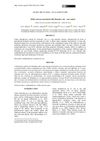 30 citations,
December 2001 in “Experimental dermatology”
30 citations,
December 2001 in “Experimental dermatology” Gonadal hormones significantly affect the severity of alopecia areata in mice.
 16 citations,
October 2023 in “Molecular cancer”
16 citations,
October 2023 in “Molecular cancer” New treatments like nanotechnology show promise in improving skin cancer therapy.
 March 2024 in “Frontiers in endocrinology”
March 2024 in “Frontiers in endocrinology” A new MTX2 gene mutation caused a severe genetic disorder in a young Chinese girl.
 June 2023 in “Dermatology and therapy”
June 2023 in “Dermatology and therapy” The Middle East and Africa need better data, treatment consensus, and support for Alopecia Areata.
 62 citations,
March 2008 in “American Journal of Human Genetics”
62 citations,
March 2008 in “American Journal of Human Genetics” Hair loss gene found on chromosome 3q26.
 222 citations,
January 2014 in “International journal of reproductive medicine”
222 citations,
January 2014 in “International journal of reproductive medicine” Insulin resistance and obesity are key factors in the development and worsening of polycystic ovary syndrome, and lifestyle changes are important for managing it.
 September 2022 in “Skin appendage disorders”
September 2022 in “Skin appendage disorders” Seborrheic dermatitis may contribute to the development of central centrifugal cicatricial alopecia.
 359 citations,
September 2017 in “European Journal of Epidemiology”
359 citations,
September 2017 in “European Journal of Epidemiology” The Rotterdam Study updated findings on elderly health, focusing on heart disease, genetics, lifestyle effects, and disease understanding.
 64 citations,
March 2017 in “Nature communications”
64 citations,
March 2017 in “Nature communications” Researchers found 63 genes linked to male-pattern baldness, which could help in understanding its biology and developing new treatments.
 7 citations,
January 2015 in “Dermatology”
7 citations,
January 2015 in “Dermatology” Two gene variations, rs6493497 and rs7176005, may be linked to female hair loss in Chinese people.
 175 citations,
November 2009 in “PLOS ONE”
175 citations,
November 2009 in “PLOS ONE” Women look young for their age due to larger lips, less sun damage, and genes that prevent gray hair and wrinkles.
 4 citations,
July 2022 in “Scientific reports”
4 citations,
July 2022 in “Scientific reports” Crossbreeding improves goat fiber quality, and specific genes affect hair traits and color.
 43 citations,
November 2018 in “Nature Communications”
43 citations,
November 2018 in “Nature Communications” Genetic variations affecting skin structure play a key role in severe acne.
 January 2024 in “Frontiers in endocrinology”
January 2024 in “Frontiers in endocrinology” The study suggests that hypothyroidism may cause alopecia areata.
50 citations,
May 2018 in “International journal of cardiology” Testosterone is linked to cardiovascular risk factors and stroke, but its exact role is unclear.
 January 2024 in “Arquivo Brasileiro de Medicina Veterinária e Zootecnia/Arquivo brasileiro de medicina veterinária e zootecnia”
January 2024 in “Arquivo Brasileiro de Medicina Veterinária e Zootecnia/Arquivo brasileiro de medicina veterinária e zootecnia” A cat with ear infection and skin issues was successfully treated for Demodex mites using imidacloprid and moxidectin.
 54 citations,
November 2015 in “Methods in enzymology on CD-ROM/Methods in enzymology”
54 citations,
November 2015 in “Methods in enzymology on CD-ROM/Methods in enzymology” Keratins are important for skin cell health and their problems can cause diseases.
 25 citations,
November 2014 in “Ageing Research Reviews”
25 citations,
November 2014 in “Ageing Research Reviews” Skin aging is caused by stem cell damage and can potentially be delayed with treatments like antioxidants and stem cell therapy.
 115 citations,
September 2000 in “The Lancet”
115 citations,
September 2000 in “The Lancet” Early hair loss may indicate risk of insulin resistance.
 21 citations,
April 2019 in “Clinical, cosmetic and investigational dermatology”
21 citations,
April 2019 in “Clinical, cosmetic and investigational dermatology” The document concludes that stopping shaving or removing affected hair can alleviate Pseudofolliculitis barbae (PFB).
 January 2000 in “BioScience”
January 2000 in “BioScience” The document concludes that understanding hair biology is key to treating hair disorders, with gene therapy showing potential as a future treatment.
 October 2024 in “Cosmetics”
October 2024 in “Cosmetics” Afro-textured hair needs personalized care due to its unique genetic traits.
 3 citations,
November 2022 in “European Journal of Human Genetics”
3 citations,
November 2022 in “European Journal of Human Genetics” New models predict male pattern baldness better than old ones but still need improvement.
 September 2023 in “The Journal of clinical endocrinology and metabolism”
September 2023 in “The Journal of clinical endocrinology and metabolism” Genetic risk for PCOS can affect children's growth, metabolism, and development from early life into adulthood.
 8 citations,
September 2016 in “Pediatric dermatology”
8 citations,
September 2016 in “Pediatric dermatology” People with Mucopolysaccharidoses often have skin problems like thick skin and extra hair, and recognizing these can help diagnose and treat the condition early.
 October 2023 in “bioRxiv (Cold Spring Harbor Laboratory)”
October 2023 in “bioRxiv (Cold Spring Harbor Laboratory)” Immune cells are essential for early hair and skin development and healing.
 1 citations,
May 2023 in “Frontiers in Endocrinology”
1 citations,
May 2023 in “Frontiers in Endocrinology” Autism's genetics are linked with early age of puberty and less hair loss, but not with hormone levels or polycystic ovary syndrome.
 October 2017 in “Springer eBooks”
October 2017 in “Springer eBooks” A thorough initial check-up is essential before sperm banking to ensure the best chance of preserving good quality sperm.

The document concludes that the development of certain tumors is influenced by genetic background and that a specific gene modification can lead to tumor regression and reduced growth.
75 citations,
July 2016 in “New phytologist” The protein RSL4 is crucial for making root hairs longer by controlling genes related to cell growth.




























